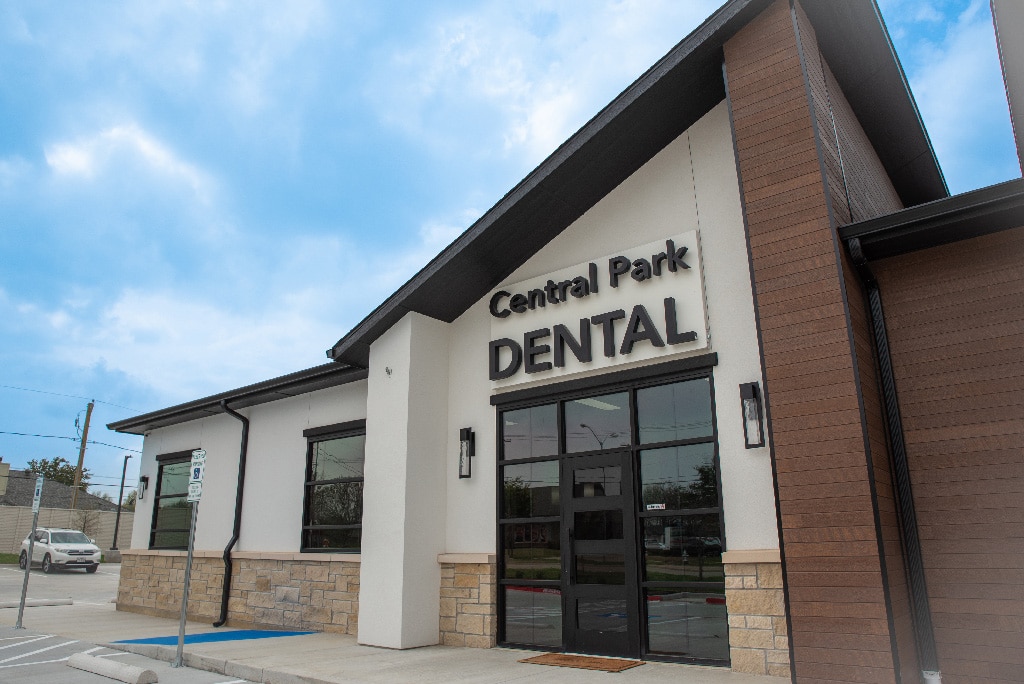
Tooth sensitivity can turn simple daily activities—like sipping hot coffee or enjoying an ice cream—into painful experiences. If you find yourself wincing at the thought of consuming certain foods or drinks, you are not alone. Tooth sensitivity affects millions of people and can be caused by several underlying dental issues. Fortunately, Dr. Jung at Central Park Dental in Mansfield, TX specializes in diagnosing and treating tooth sensitivity to help you regain comfort and confidence in your smile.
What Is Tooth Sensitivity?
Tooth sensitivity, also known as dentin hypersensitivity, occurs when the protective enamel layer of your teeth wears down, exposing the underlying dentin and microscopic tubules that connect to nerve endings. When hot, cold, sweet, or acidic substances reach these nerve endings, they trigger discomfort or pain.
Common Causes of Tooth Sensitivity
1. Enamel Erosion
Your enamel serves as the protective outer layer of your teeth. Over time, acidic foods, frequent consumption of sugary beverages, and aggressive brushing can wear down the enamel, leaving your teeth vulnerable to temperature changes and irritants.
2. Receding Gums
Gum recession exposes the roots of your teeth, which lack enamel protection. This condition can be caused by periodontal disease, excessive brushing pressure, or aging. Exposed roots are highly sensitive to external stimuli.
3. Tooth Decay and Cavities
Untreated cavities weaken the tooth structure, creating openings that expose the dentin. Bacteria and food particles can aggravate the nerves, leading to increased sensitivity and discomfort.
4. Cracked or Chipped Teeth
A crack or fracture in a tooth can allow irritants to reach the inner layers, causing sharp pain when biting or consuming hot and cold foods.
5. Teeth Grinding (Bruxism)
Grinding your teeth at night, often unknowingly, can gradually wear down the enamel, making your teeth more sensitive. Dr. Jung offers customized night guards to protect against enamel erosion caused by grinding.
6. Overuse of Whitening Products
Many over-the-counter whitening treatments contain peroxides or abrasives that can weaken enamel and increase sensitivity. Professional teeth whitening under the care of a dental expert minimizes the risk of damage.
7. Post-Dental Procedure Sensitivity
Some dental treatments, including fillings, crowns, or professional cleanings, may temporarily cause tooth sensitivity. This discomfort usually subsides after a few days, but if it persists, Dr. Jung can assess and provide solutions.
Diagnosing Tooth Sensitivity at Central Park Dental
At Central Park Dental, Dr. Jung takes a personalized approach to diagnosing and treating tooth sensitivity. When you visit our Mansfield, TX office, we perform a comprehensive evaluation that includes:
- A detailed review of your dental and medical history
- A thorough oral examination
- Digital X-rays to identify hidden dental issues
- A sensitivity test to pinpoint the affected areas
Understanding the root cause of your tooth sensitivity allows us to create an effective treatment plan tailored to your needs.
Treatment Options for Tooth Sensitivity
1. Desensitizing Toothpaste
A simple yet effective solution, desensitizing toothpaste contains compounds like potassium nitrate that block pain signals from reaching the nerves. Regular use can significantly reduce discomfort.
2. Root Canal Therapy
In severe cases where sensitivity is caused by deep infection or nerve damage, root canal treatment may be necessary to remove the affected nerve and eliminate pain permanently.
3. Dental Bonding or Sealants
For areas with significant enamel loss or exposed roots, dental bonding or protective sealants can cover the affected areas and shield the nerves from external stimuli.
4. Gum Grafting
If gum recession is the cause of sensitivity, a gum grafting procedure can restore lost gum tissue and protect exposed tooth roots from further irritation.
5. Night Guards for Teeth Grinding
For patients who grind their teeth, custom night guards prevent further enamel wear, reducing sensitivity and preventing long-term damage.
How to Prevent Tooth Sensitivity
Preventing tooth sensitivity starts with good oral hygiene habits and regular dental visits. Dr. Jung recommends the following practices:
- Use a soft-bristled toothbrush to avoid enamel wear and gum recession.
- Brush gently with fluoride toothpaste twice a day to strengthen enamel and protect against cavities.
- Floss daily to remove plaque buildup and prevent gum disease.
- Limit acidic foods and beverages such as citrus fruits, sodas, and vinegar-based dressings.
- Drink water after consuming acidic or sugary foods to neutralize acids and wash away debris.
- Visit Dr. Jung at Central Park Dental regularly for professional cleanings and exams.
Why Choose Central Park Dental for Tooth Sensitivity Treatment?
At Central Park Dental, we prioritize patient comfort and long-term oral health. Dr. Jung’s extensive experience and advanced technology allow us to offer the most effective, minimally invasive solutions for tooth sensitivity. Whether you need preventive care, restorative treatments, or specialized procedures, we are here to help.
Don’t Let Tooth Sensitivity Affect Your Quality of Life!
If you’re experiencing tooth sensitivity, pain, or discomfort, schedule a consultation with Dr. Jung at Central Park Dental today. Our team is committed to restoring your smile’s health and ensuring long-term relief.
Your Smile Deserves the Best Care—Let’s Keep It Healthy Together!


